Strategic Thought Transformation - The IIPM Think Tank
Strategic Thought Transformation - The IIPM Think Tank
Strategic Thought Transformation - The IIPM Think Tank
Create successful ePaper yourself
Turn your PDF publications into a flip-book with our unique Google optimized e-Paper software.
S T R A T E G I C I N S I G H T<br />
encing the gains and losses of tangible<br />
assets. Skilled technical staff increase the<br />
rate at which good new products can be<br />
launched, distributors are won to brands<br />
that are well-regarded, and staff turnover<br />
is faster when morale is poor.<br />
Generically, we can lay out the causal<br />
logic connecting intangible resources,<br />
through changes to the tangible resources<br />
and their quality, through to performance<br />
(see Figure 7). Only if investors have both<br />
good information on these items and how<br />
they are changing, and a solid understanding<br />
of how the interdependencies work,<br />
will they be able to make a well-informed<br />
judgement about the growth potential<br />
and sustainability of the businesses. <strong>The</strong>y<br />
should certainly expect that managers have<br />
such an understanding of the strategy of<br />
their organisations.<br />
Certain firms have a strong grasp of<br />
these dependencies on intangible factors.<br />
Barclays Bank, for example, has excellent<br />
insight into the relationship between service<br />
quality, customer perceptions, and loyalty.<br />
Major pharmaceutical firms understand<br />
deeply how the support of key opinion leaders<br />
among medical specialists drives uptake<br />
of their products in the wider market. But<br />
confident, rigorous information and analysis<br />
of this kind is exceptional, and balanced<br />
scorecards used by firms are typically vague<br />
about the interdependencies involved.<br />
Investors, then, are quite right to expect<br />
management to show a professional grasp<br />
of intangible factors. However, unless they<br />
also have information about the full range<br />
of tangible assets, the quality of those assets<br />
and the firm’s ability to build, develop,<br />
Figure 7<br />
Investors are quite<br />
right to expect<br />
management to<br />
show a<br />
professional grasp<br />
of intangible<br />
factors<br />
and retain those assets, they stand little<br />
chance of estimating the strength of its<br />
strategy, its likely performance prospects,<br />
and hence its value.<br />
To disclose or not<br />
While investors might welcome complete<br />
transparency about the resources and performance<br />
of the businesses they support,<br />
managers are naturally nervous about exposing<br />
the details of their strategic architecture<br />
to potential attack by competitors.<br />
Yet, there may still be a persuasive case<br />
for greater openness. M&S declared outstanding<br />
operating profits from 1995 to<br />
1998. Indeed, just about every financial<br />
fundamental was believed by analysts to<br />
be exemplary – margins, productivity, asset<br />
utilisation, etc. As we noted earlier,<br />
though, customer acquisition and retention<br />
were both in trouble and the intangibles were<br />
falling apart. How might<br />
analysts have reacted, had<br />
the company said in 1995<br />
that it would be investing<br />
£200 million every year to<br />
enhance quality, service,<br />
and value, and back that<br />
up with evidence to show<br />
how essential that investment<br />
had become Would<br />
management really have<br />
been criticised for such a<br />
stance Would predators really<br />
have seen the company<br />
as a wounded animal, and<br />
had a credible case for taking it over<br />
It can even be competitively advantageous<br />
to be open about your strategic architecture<br />
and why it performs as it does. Sector after<br />
sector is bedevilled by companies with a<br />
limited grasp on strategic management, but<br />
which still think they can perform by pursuing<br />
simplistic policies. Unsustainable discounting<br />
with excessive marketing in many financial<br />
service markets is currently a case in point.<br />
Firms led by professional strategic management<br />
can show just what it takes to perform<br />
strongly, and thereby discourage foolish behaviour<br />
by less competent rivals and wouldbe<br />
newcomers.<br />
<strong>The</strong>re is a further reason why management<br />
might choose more openness. Shortly<br />
after the 1999 stock market collapse, which<br />
many of us should have seen coming, I asked<br />
an audience of investment analysts what it<br />
might have been worth to know, two ears<br />
ahead of time, that a company would be in<br />
trouble. <strong>The</strong>ir view <strong>The</strong>y would have preferred<br />
the information to remain undisclosed,<br />
since it would have lost them four half-year<br />
opportunities to exploit the misunderstanding<br />
and push management into pursuing earnings<br />
increases, even though those increases were<br />
both unsustainable and certain to destroy the<br />
integrity of the firm’s strategic architecture. A<br />
cynic might even wonder if they were looking<br />
forward to making yet more money as<br />
the share price collapsed, and perhaps more<br />
again when takeover speculation started. A<br />
greater degree of openness by management<br />
about the true state and prospects of their<br />
business could just give them, and their longterm<br />
investors, some protection against this<br />
kind of short-term manipulation.<br />
Kim Warren (kwarren@london.<br />
edu) is a teaching fellow in strategic<br />
and international management<br />
at London Business School.<br />
His books include Competitive<br />
Strategy Dynamics (Wiley, 2002)<br />
and <strong>The</strong> Critical Path (Vola Press,<br />
2003). He would like to acknowledge<br />
the input of Donald Nordberg<br />
of EDGEvantage Ltd (www.<br />
edgevantage.com) and Hanif<br />
Barma of Independent Audit Ltd.<br />
(www.independentaudit.com) in<br />
writing this article.<br />
58<br />
STRATEGIC INNOVATORS<br />
An <strong>IIPM</strong> Intelligence Unit Publication



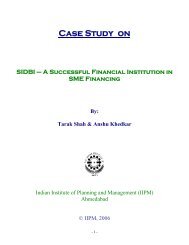
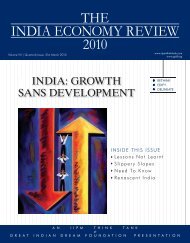
![[Feb 2008, Volume V Annual Issue] Pdf File size - The IIPM Think Tank](https://img.yumpu.com/43961117/1/190x245/feb-2008-volume-v-annual-issue-pdf-file-size-the-iipm-think-tank.jpg?quality=85)
![[June 2008, Volume V Quarterly Issue] Pdf File size - The IIPM Think ...](https://img.yumpu.com/41693247/1/190x245/june-2008-volume-v-quarterly-issue-pdf-file-size-the-iipm-think-.jpg?quality=85)

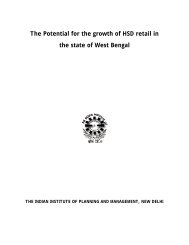
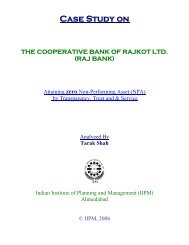
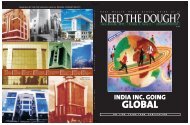
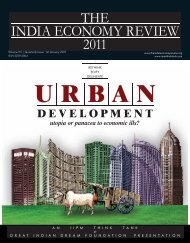
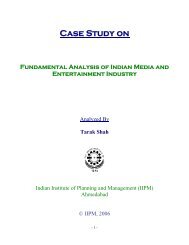
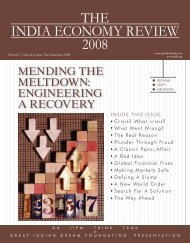
![[Dec 2007, Volume 4 Quarterly Issue] Pdf File size - The IIPM Think ...](https://img.yumpu.com/29766298/1/190x245/dec-2007-volume-4-quarterly-issue-pdf-file-size-the-iipm-think-.jpg?quality=85)
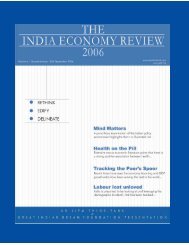
![[Volume VI | Quarterly Issue: 31st May 2009] Pdf File size](https://img.yumpu.com/27796051/1/190x245/volume-vi-quarterly-issue-31st-may-2009-pdf-file-size.jpg?quality=85)